Serving 327 students in grades Kindergarten-5, Point Fermin Elementary School ranks in the top 50% of all schools in California for overall test scores (math proficiency is top 30%, and reading proficiency is top 30%).
The percentage of students achieving proficiency in math is 40-44% (which is higher than the California state average of 33%). The percentage of students achieving proficiency in reading/language arts is 45-49% (which is approximately equal to the California state average of 47%).
The student:teacher ratio of 22:1 is higher than the California state level of 21:1.
Minority enrollment is 82% of the student body (majority Hispanic), which is higher than the California state average of 80% (majority Hispanic).
Quick Stats (2025)
- Grades: Kindergarten-5
- Enrollment: 327 students
- Student:Teacher Ratio: 22:1
- Minority Enrollment: 82%
- Overall Testing Rank: Top 50% in CA
- Math Proficiency: 40-44% (Top 30%)
- Reading Proficiency: 45-49% (Top 50%)
- Science Proficiency: 20-29% (Top 50%)
- Source: National Center for Education Statistics (NCES), CA Dept. of Education
School Overview
Point Fermin Elementary School's student population of 327 students has stayed relatively flat over five school years.
The teacher population of 15 teachers has grown by 7% over five school years.
Grades Offered
Grades Kindergarten-5
Total Students
327 students
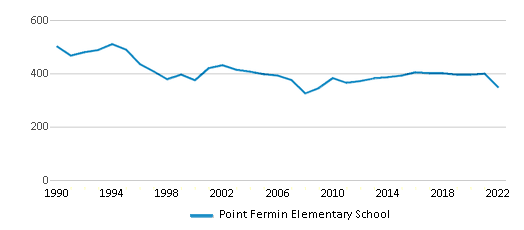
Gender %
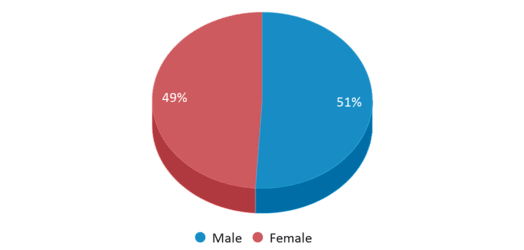
Total Classroom Teachers
15 teachers
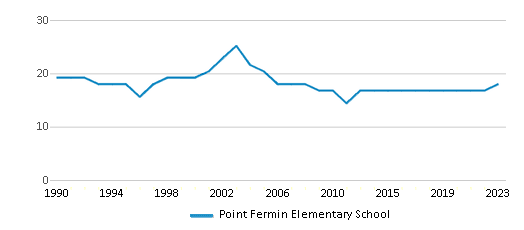
Students by Grade
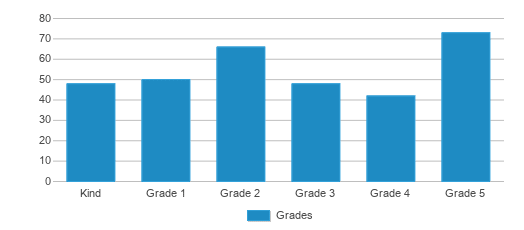
School Calendar
School Rankings
Point Fermin Elementary School ranks within the top 50% of all 9,602 schools in California (based off of combined math and reading proficiency testing data).
The diversity score of Point Fermin Elementary School is 0.61, which is less than the diversity score at state average of 0.63. The school's diversity has stayed relatively flat over five school years.
Overall Testing Rank
#3357 out of 9602 schools
(Top 50%)
(Top 50%)
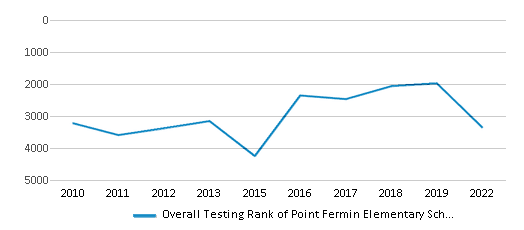
Math Test Scores (% Proficient)
40-44%
33%
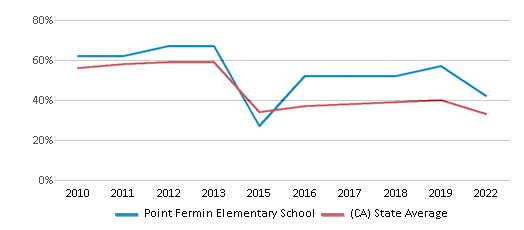
Reading/Language Arts Test Scores (% Proficient)
45-49%
47%
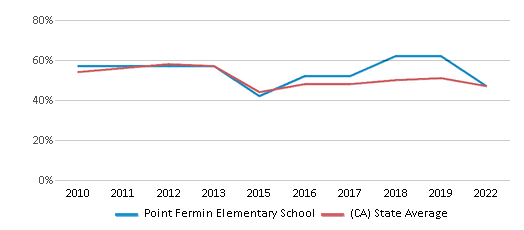
Science Test Scores (% Proficient)
20-29%
29%
Student : Teacher Ratio
22:1
21:1
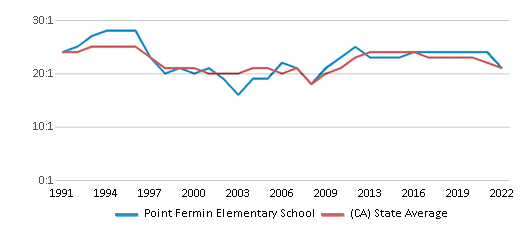
American Indian
n/a
1%
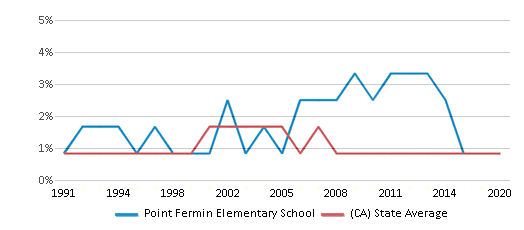
Asian
5%
12%
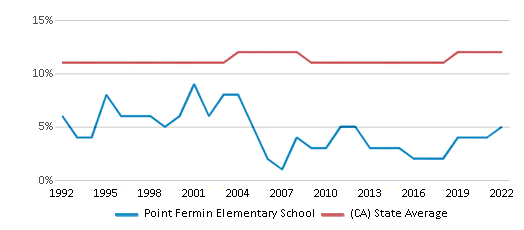
Hispanic
59%
56%
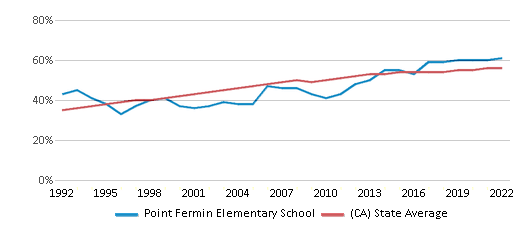
Black
9%
5%
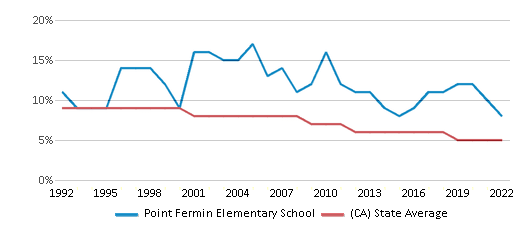
White
18%
20%
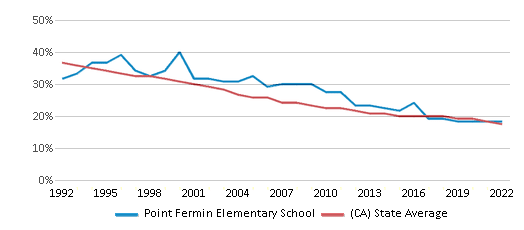
Hawaiian
n/a
n/a
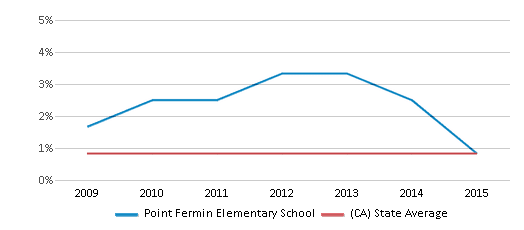
Two or more races
9%
6%
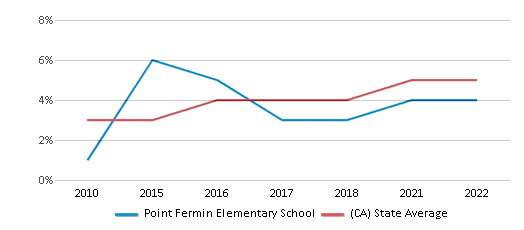
All Ethnic Groups
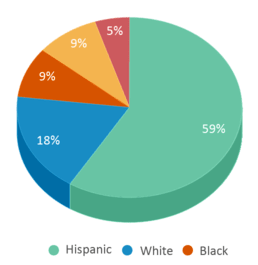
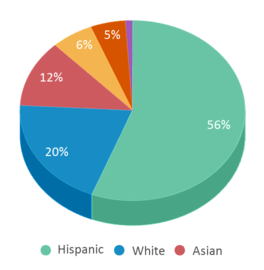
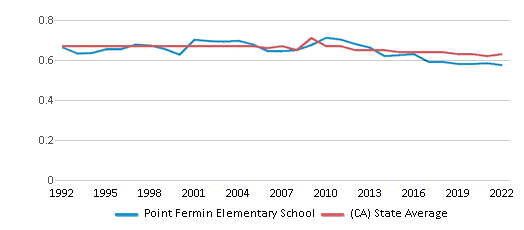
Eligible for Free Lunch
53%
54%
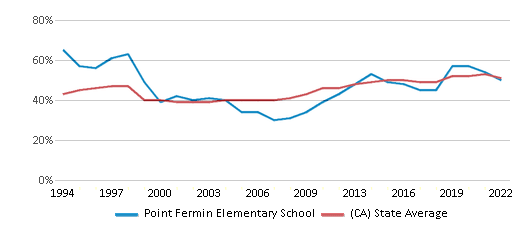
Eligible for Reduced Lunch
6%
8%
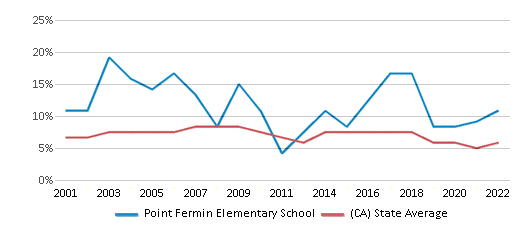
School Statewide Testing
School District Name
Source: National Center for Education Statistics (NCES), CA Dept. of Education
Profile last updated: 02/09/2025
Frequently Asked Questions
What is Point Fermin Elementary School's ranking?
Point Fermin Elementary School is ranked #3357 out of 9,602 schools, which ranks it among the top 50% of public schools in California.
What schools are Point Fermin Elementary School often compared to?
Point Fermin Elementary Schoolis often viewed alongside schools like White Point Elementary School by visitors of our site.
What percent of students have achieved state testing proficiency in math and reading?
40-44% of students have achieved math proficiency (compared to the 33% CA state average), while 45-49% of students have achieved reading proficiency (compared to the 47% CA state average).
How many students attend Point Fermin Elementary School?
327 students attend Point Fermin Elementary School.
What is the racial composition of the student body?
59% of Point Fermin Elementary School students are Hispanic, 18% of students are White, 9% of students are Black, 9% of students are Two or more races, and 5% of students are Asian.
What is the student:teacher ratio of Point Fermin Elementary School?
Point Fermin Elementary School has a student ration of 22:1, which is higher than the California state average of 21:1.
What grades does Point Fermin Elementary School offer ?
Point Fermin Elementary School offers enrollment in grades Kindergarten-5
What school district is Point Fermin Elementary School part of?
Point Fermin Elementary School is part of Los Angeles Unified School District.
School Reviews
5 9/26/2007
My child has learned so much from her pre-Kindergarten teacher, she 'actually' loved getting up in the morning and getting in her uniform to go to Pt. Ferman. I would highly recommend this school not only for the fun way of learning they present but also, from a parents' standpoint, the # of children per teacher, the average gpa was above average for the district and it's nice to see the same teachers & staff year after year. The turnaround (students excluded) is very low.
Review Point Fermin Elementary School. Reviews should be a few sentences in length. Please include any comments on:
- Quality of academic programs, teachers, and facilities
- Availability of music, art, sports and other extracurricular activities
Recent Articles

What Is A Charter School?
Explore the world of charter schools in this comprehensive guide. Learn about their history, how they operate, and the pros and cons of this educational innovation. Discover key facts about charter schools, including admission policies, demographics, and funding, as well as what to look for when considering a charter school for your child.

10 Reasons Why High School Sports Benefit Students
Discover the 10 compelling reasons why high school sports are beneficial for students. This comprehensive article explores how athletics enhance academic performance, foster personal growth, and develop crucial life skills. From improved fitness and time management to leadership development and community representation, learn why participating in high school sports can be a game-changer for students' overall success and well-being.

February 05, 2025
Understanding the U.S. Department of Education: Structure, Impact, and EvolutionWe explore how the Department of Education shapes American education, from its cabinet-level leadership to its impact on millions of students, written for general audiences seeking clarity on this vital institution.






